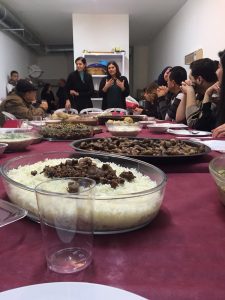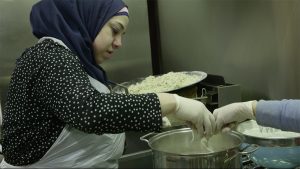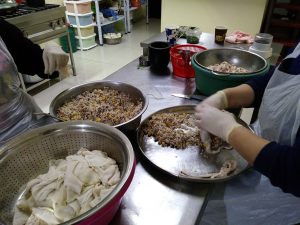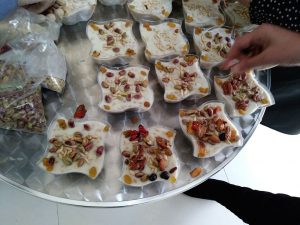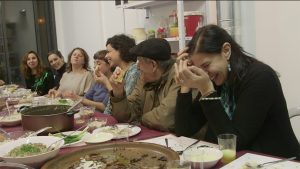Family Dinners Project Part 4 of 6
Food has always been a representation of class, time, and power. It creates a unique atmosphere conducive to encounter. Sharing food sets the table with aspects of hospitality, distribution, exchange, familiarity, and pleasure. A shared meal can become a space for reflection on socio-political realities, attitudes, fashions of the time, and even the suppressed elements of history.
In a research project that documents Palestinian food practices, initiated by artist Mirna Bamieh and supported by the Public Program of A.M. Qattan Foundation, “Family Dinners” is a series of five dinners that were served over a two-month period to groups of food enthusiasts. This article describes the third dinner.
Titled “On the Table of Rummana Kitchen,” this dinner was organized by Fatin Farhat in cooperation with a local kitchen that opened in Al Tireh/Ramallah in 2017 and soon became an important “community center” in the neighborhood. It is run by Sona Qaod, a breast cancer survivor and activist who opened it as a form of personal therapy and catharsis. To create the menu, Fatin engaged in a dialogue with Sona and the three women with whom she runs Rummana Kitchen: Lina, Mona, and Diana. Over the course of a month, Fatin learned about their life stories, the recipes they grew up with, and their relationship with food.
Sona created this kitchen as a way of healing. Rather than aiming for profit, she wanted to build a community that shares stories and common values in their eating habits. At Rummana Kitchen, Sona meets visitors who are dieting (mainly women), working women from outside Ramallah who have no support system, and lonely divorced men or widowers who not only come for the food but also for a chat and company.
Lina is the main cook at Rummana. She is from Beitin, where her grandmother taught her how to cook. Lina’s passion for food is intertwined with a love story: she allured her husband with cooking. In Sona she found the mother figure she’s been yearning for since childhood.
Mona, the youngest woman in the kitchen, is originally from Qalqilya and came to Ramallah in search of a job. Although Mona’s quest for social independence is continuing, her approach to cooking remains conventional. She cooks what she knows and is still reluctant to venture into new tastes and trails.
Diana is an animated character who wears several hats: trained as a medical secretary, she currently studies business administration and works as a cook at Rummana.
The group settled on presenting traditional dishes that, due to their complexity, are generally not cooked at home. The exquisite menu included Fatin’s Soup, a detox soup that Fatin once requested after the holiday seasons – since then, it has held a place on the menu under Fatin’s name; lentil soup with green apples; Salatet Rummana, a healthy signature dish based on quinoa and a mix of beans and parsley; Rummanieh, a dish from Yaffa that contains brown lentils, eggplant, sour pomegranate juice, and red tahini; Rqaq-b-adas, a traditional dish prepared in Palestinian villages from brown lentils and little squares of dough, topped with fried onion; Salatet al Hassadeen, a cold salad made of stir-fried zucchini mixed with yogurt (Palestinian farmers used to take this dish with them to the fields during in harvest season); Shakrieh, a Nabulsi dish of lamb meat cooked in yogurt and served with rice; stuffed beets cooked in tahini sauce; Karshat-wa- fawaregh, stuffed and roasted tripe (cow’s stomach) with a lemon and garlic dressing; Fattet el-sanat, rice with garlic, topped with roasted tongue; Ashura, a wheat-based dessert that traditionally is served to friends and neighbors when a baby’s first tooth has come out; and Malateet, a traditional bread that is made from olive oil, wheat, and a mix of spices (in sweet and savory options) and used to be a stable on Palestinian breakfast tables and in the safartas (lunchboxes) of students.
The menu was presented to the 30 guests whom Rummana Kitchen considers their main community, as they share its vision regarding excellence in Palestinian cuisine, healthy eating habits, and women’s solidarity and power.

